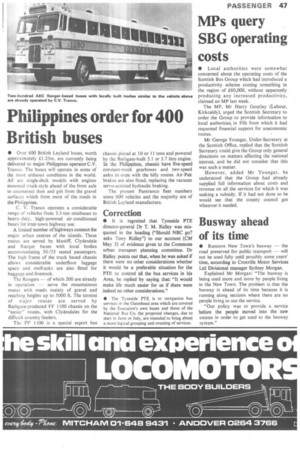Philippines order for 400 British buses
Page 49

If you've noticed an error in this article please click here to report it so we can fix it.
• Over 400 British Leyland buses, worth approximately £1.25m, are currently being delivered to major Philippines operator C.V. Tranco. The buses will operate in some of the most arduous conditions in the world. All are single-deck models with engines mounted truck-style ahead of the front axle to counteract dust and grit from the gravel surfaces which form most of the roads in the Philippines.
C. V. Tranco operates a considerable range of vehicles from 3.5-ton minibuses to heavy-duty, high-powered air-conditioned buses for inter-town highway use.
A limited number of highways connect the major urban centres of the islands. These routes are served by Mastiff, Clydesdale and Ranger buses with local bodies accommodating 50/55 seated passengers. The high frame of the truck based chassis allows considerable underfloor luggage space and roofracks are also fitted for baggage and livestock.
The Rangers of which 200 are already in operation serve the mountainous
routes with roads mainly of gravel and reaching heights up to 5000 ft. The termini of major routes are served by Bathgate-produced FE 1100 chassis on the "easierroutes, with Clydesdales for the difficult country feeders.
The FF 1100 is a special export bus
chassis plated at 10 or Il tons and powered by the Bathgate-built 5.1 or 5.7 litre engine. In the Philippines, chassis have tive-speed constant-mesh gearboxes and two-speed axles to cope with the hilly routes. Air-Pak brakes are also fitted, replacing the vacuum servo-assisted hydraulic braking.
The present Pantranco fleet numbers some 600 vehicles and the majority are of British Leyland manufacture.
Correction
• It is regretted that Tyneside PTE director-general Dr T. M. Ridley was misquoted in the heading ("Should NBC go? asks Tony Ridley") to our account (CM May 5) of evidence given to the Commons urban transport planning committee. Dr Ridley points out that, when he was asked if there were no other considerations whether it would be a preferable situation for the PTE to control all the bus services in his Area, he replied by saying that: "It would make life much easier for us if there were indeed no other considerations."
• The Tyneside PTE is to reorganize bus services in the Gateshead area which are covered by the Executive's own buses and those of the National Bus Co. the proposed changes, due to start in June or July, are intended to bring about a more logical grouping and routeing of services.
















































































































































































































